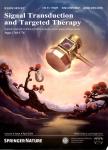Norovirus P particle-based tau vaccine-generated phosphorylated tau antibodies markedly ameliorate tau pathology and improve behavioral deficits in mouse model of Alzheimer’s disease
作者机构:National Engineering Laboratory for AIDS VaccineSchool of Life SciencesJilin UniversityChangchun 130012China Laboratory of Pathogenic Microbiology and ImmunologyCollege of Life ScienceJilin Agricultural UniversityChangchun 130012China Key Laboratory for Molecular Enzymology and Engineeringthe Ministry of EducationSchool of Life SciencesJilin UniversityChangchun 130012China
出 版 物:《Signal Transduction and Targeted Therapy》 (信号转导与靶向治疗(英文))
年 卷 期:2021年第6卷第3期
页 面:593-595页
核心收录:
学科分类:1002[医学-临床医学] 100203[医学-老年医学] 10[医学]
基 金:supported by National Natural Science Foundation of China[No.31971142] Science&Technology Development Plan of Jilin Province[No.20190201185JC,No.20190103073JH,No.2018C004] Fundamental Research Funds for the Central Universities[No.2019JCXK-55] Science&Technology Research Project of The Education Department of Jilin Province[No.JJKH20200949KJ]
摘 要:Dear Editor,Currently,there are no FDA-approved disease-modifying therapies that can prevent,halt,or reverse Alzheimer s disease(AD).As the unsatisfactory of amyloid-p-targeted treatment in recent years,development of Tau-targeted active immunotherapy takes much concern.1 Tau protein,a major microtubule-associated protein in the nervous system,was found to be abnormally hyperphosphorylated at six epitopes:Ser396/404,Ser202,Thr205,Ser238,and Ser262 in AD patients.2 Hence,immunotherapy targeting more highly-expressed phosphorylated Tau(pTau)species may induce a sufficient pool of pTau antibodies to eliminate pathological tau and elicit cognitive improvement.



